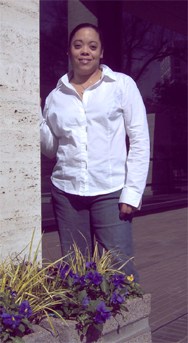


 |
 |
 |
|||||||||||
|
|
|
||||||||||||
|
|
|
|
|
|
|
|
|
|
|
|
|||
|
|
|
|
|
|
|
|
|
|
|
|
|
|
|

|
A New Trend? Amachi Vista Becomes Full-Time Employee When Nickell Durham volunteered to serve as an AmeriCorps* VISTA volunteer for Big Brothers Big Sisters of Metro Atlanta’s Amachi program in August 2003, she had no idea that by January 2005 she would be hired full-time as the agency’s program manager for faith-based programs. Durham now supervises two new VISTAs and is responsible for recruiting children. “We see having VISTA workers as a good succession plan to getting employees,” said Charcella Green, vice president of program services for BBBS of Metro Atlanta. “If we bring them in well and are selective as to how we bring them in, then that can be a very important part of a succession plan for the agency. She already knew the job that she was coming to. She understands the work. She has the passion for it and the skill level, and by hiring somebody that’s been here for a year and a half there is no loss of production as a result of her coming into that position.” Although Durham has slightly different responsibilities than she had as a VISTA worker, she feels fully equipped to handle them. During her VISTA term, Durham focused on recruiting volunteers from faith-based organizations and assisting the director with interviews and making matches. However, during that time she also took the initiative to learn all aspects of Amachi program management. “During the whole year as a VISTA, I pretty much jumped in and did every and any thing that I could to help, and so what I’m doing now is almost what I’ve been doing,” said Durham. “When I went to [VISTA] training I just took everything in, and as I went along through the years I just referred back to my notes and what I heard through training as a support system. Even when I switched over to this position I resorted back to my notes to see if I was on the right track [and] if there was something I could do to make my position a little smoother and my understanding with it clearer. I did a lot of reflecting with it.” Durham is the only member of the Amachi staff who has been with the program for the last year and a half, and BBBS of Metro Atlanta recognizes the importance of having her on the team. “She has really been an asset to the director,” said Green. “She knows how to manage up. He’s only been here about a month and a half. So [by] having her here for a year and a half she can really be an asset to him.” The best part of working for the Amachi program is seeing the children happy after a match is made, according to Durham. One of the best moments she had was matching a 13-year-old male who had been waiting for six months for a mentor. The young mentee, who lived with his overwhelmed grandmother, was failing school and contemplating suicide. Amachi Atlanta was able to match him with a mentor in his mid 40’s who is teaching the mentee carpentry by doing projects on the mentee’s grandmother’s home, work that the grandmother couldn’t afford to get done otherwise. A couple of months after the match, Durham said she was in a crowd and felt someone tap her on the back. She turned around and was surprised to see the mentee. The young boy simply said, “thank you.” “[The mentor] made a difference in a short period of time, and that’s what I call success for Amachi,” she added.. Durham is excited about the opportunity to continue with Amachi Atlanta and help ensure the program reaches its match goal of 300 children by the end of 2005. According to Green she is well on her way. They made their match goals for January and February.
Spring 2005
|